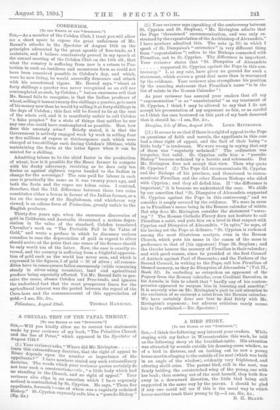COBDENISM.
[To THE. EDITOR Or TEE " &ROTATOR."] Stn.,—As a member of the Cobden Club, I trust you will allow me a short space to expose the great unfairness of Mr. Round's attacks in the Spectator of August 18th on the principles advocated by the great apostle of free-trade, as I maintain, and I believe conclusively proved in my speech at the annual meeting of the Cobden Club on the 14th ult., that what the country is suffering from now is a return to Pro- tection in such an insidious and monstrous form as could not have been conceived possible in Cobden's day, and which, were he now living, he would assuredly denounce and attack with his accustomed vigour. Mr. Round says, " wheat at forty shillings a quarter was never recognised as an evil nor contemplated as such, by Cobden ; " but an enormous evil that Mr. Round fails to recognise, is that the Indian producer of wheat, selling it here at twenty-five shillings a quarter, gets more of his money now than he would by selling it at forty shillings in the days of Cobden ; this fact will be found to lie at the root of the whole evil, and it is manifestly unfair to call Cobden "a false prophet" for a, state of things that neither he nor any one else could have contemplated as possible. Now, how does this anomaly arise P Briefly stated, it is that the Government is actively engaged week by week in selling four or five millions of rupees at thirteenpence each which were charged at two shillings each during Cobden's lifetime, while maintaining the florin at the latter figure when it can be minted for a shilling.
Admitting labour to be the chief factor in the production of wheat, how is it possible for the Essex farmer to compete with his dusky adversary, receiving as he does only ten florins as against eighteen rupees handed to the Indian in change for the sovereign ? The rate paid for labour in each case is practically the same as it was twenty years ago, and both the florin and the rupee are token coins. I contend, therefore, that the lid. difference between these two coins constitutes either a bonus in favour of the Indian farmer, or a tax on the money of the Englishman, and whichever way viewed, is an odious form of Protection, grossly unfair to the English producer.
Thirty-five years ago, when the enormous discoveries of gold in California and Australia threatened a serious depre- ciation in the value of the standard, Cobden translated Chevalier's work on " The Probable Fall in the Value of Gold," and wrote a preface in which he discusses various remedies in case the depreciation of gold in regard to silver should arrive at the point that one ounce of the former should be only worth ten of the latter. Now, the case is exactly re- versed, and the country is suffering from a frightful apprecia- tion of gold such as the world has never seen, and which is expressed in the figures, 1 of gold = 35 of silver ; all commo- dities have in consequence fallen enormously (while remaining steady in silver,using countries), land and agricultural produce being especially affected. Yet Mr. Round fails to per. ceive the cause, abuses Cobden and Free-trade, and ignores the undoubted fact that the most prosperous times for the agricultural interest was the period between the repeal of the Corn-laws and the commencement of this appreciation of gold.—I am, Sir, &c.,
































 Previous page
Previous page